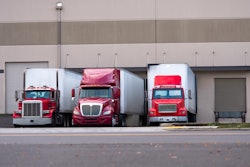Switching to zero-emission trucks should be a win for its fuel cost advantage. However, those savings can vanish quickly as higher insurance premiums push total expenses up.
Zero-emission trucks, particularly battery-electric models, have a higher sticker price than comparable diesel units.
“If you double the sticker price, your insurer has to plan for paying out more if there’s a total loss or big repair, so naturally the premium follows that higher value,” said Mike Dull, president of insurance agency EV Universe.
There’s also more advanced technology – sensors, driver-assist systems and complex battery management – which can be expensive to repair. On top of that, repair infrastructure is still developing.
“A diesel can roll into just about any truck shop, but an electric unit usually needs a specialized center, dealer, a remote tech and even finding parts can drag out downtime," Dull said. "That adds risk in the eyes of underwriters."
Cost-wise, Dull said insurance premiums for battery-electric trucks typically run 30% to 50% higher than for diesel. A diesel truck that costs about $12,000 a year to insure might see a BEV premium in the $16,000 to $18,000 a year range, depending on mileage, driver profiles, and cargo.
[RELATED: How trucking's costs changed in 2024 from 2023]
Hydrogen trucks can cost even more, he said, due to higher vehicle prices and limited-service infrastructure.
A big challenge is how insurers are assessing the risk profile for zero-emission trucks, especially when there’s a lack of long-term data available, Dull said. Most insurers are still leaning on traditional fleet auto models with adjustments for battery systems, heavier weight, and advanced tech.
Some carriers are relying on telematics and live vehicle data to refine pricing, he said, though this can work against fleets if the data is inaccurate.
“Bad data in equals bad pricing out," he said.
An alternative for small fleets
In 2021, the California Air Resources Board’s Clean Truck and Bus Voucher Incentive Project (HVIP) introduced the Innovative Small-E Fleet Pilot Program (ISEF) to help small fleets and owner-operators lower the upfront costs of medium- and heavy-duty zero-emission vehicles.
With the ISEF program, fleets with 20 or fewer trucks and an annual revenue of less than $15 million can tap into flexible financing for zero-emission trucks and offers vouchers for standard purchases, leases, rentals, and truck-as-a-service models.
In June, the program held a webinar discussing options for eligible participants, as well as addressing challenges faced by fleets. Rabab Charafeddine, climate risk specialist at the California Department of Insurance, discussed options to reduce costs for fleets, including offering a used truck voucher and technical assistance for drivers.
Another option raised was to provide initial insurance coverage for a six- to 12-month period. These new options are expected to take one to two years to develop and roll out, a CARB spokesperson said. Though it's currently closed for applications, CARB said ISEF is to reopen in early fall of this year.
Charafeddine also highlighted a report published by CDI, in collaboration with CARB, examining the insurance gaps for zero-emission medium and heavy-duty truck technologies.
One of the findings showed that 249 insurers offered commercial auto coverage in California and identified those providing policies for zero-emission drayage trucks. Among the 60 companies insuring trucks in drayage operations, none distinguished between zero-emission and internal combustion models in their rating factors or data collection methods.
“Emerging insurance options may be unknown to consumers, and lack of observed data on losses can limit the capacity or interest to insure new technologies in the insurance sector,” the report said.
The study found that insurers are neither treating zero-emission trucks differently nor tracking how they perform compared to diesel trucks. Residual value data also isn’t tracked, which the report pointed out as crucial as it represents the financial risk in the event of a loss claim.
No loss data specific to zero-emission trucks had been collected, meaning insurers couldn’t determine whether these trucks have better or worse accident outcomes.
“This is a missed opportunity,” Charafeddine pointed out, as zero-emission trucks often include built-in advantages like regenerative braking and fewer moving parts, which can reduce maintenance needs.
Available data – both gathered directly and from CDIA’s secondary research – suggests lower accident rates, but without insurers tracking this, those potential benefits aren’t being reflected in premiums, she added.
The study also recommended the following strategies to address insurance gaps:
- Grow zero-emission technology knowledge in the insurance sector
- Facilitate cross-sector information sharing on financing and insurance metrics
- Promote data collection and risk assessment
- Explore innovative solutions that expand insurance options
Reducing insurance costs for zero-emissions trucks
At the end of the day, Dull said the basics still matter, such as having safe drivers, good maintenance and solid documentation. But with zero-emission trucks, utilizing telematics to demonstrate safe and efficient operations is important.
Establishing a vetted repair network ahead of time is crucial, as well as training drivers on proper handling and charging procedures. Some insurers would also give credit for advanced driver assist systems and showing they’re in use.
Operators should also shop around, as some insurers are more comfortable with ZE risk than others, and budget for higher premiums in the near term. Over time, as repair networks grow and more loss data becomes available, Dull said premiums are likely to come down.










